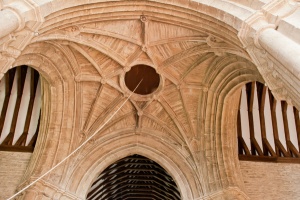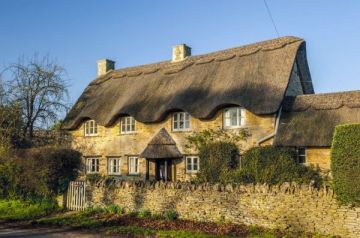
St Kenelm was an 8th-century boy-king of Mercia, murdered on the order of his sister. When he was buried at Winchcombe Abbey miracles were reported at his tomb. Kenelm's shrine became a destination for pilgrims, and along the main pilgrim routes to Winchcombe, churches were dedicated in Kenelm's name. A church dedicated to Kenelm was founded here on the north bank of the River Windrush at least as early as the 12th century.
Not only was the church dedicated to Kenelm, but local festivals grew up around his saint day, 17 July. On the nearest Tuesday or Wednesday to the 17th July, a Minster Feast was held, and free drinks of a home-made rhubarb wine called 'Jerkum' were given away at the nearby Old Swan inn.
In 1431 William, the 7th Baron Lovell, tore down the 12th-century manor beside the river and built a grand new manor, now known as Minster Lovell Hall (English Heritage). At the same time to completely rebuilt the 12th-century church in fashionable Perpendicular Gothic style. The church was independent of Lovell's estate and was settled on the French abbey at Ivry.

You enter by the north porch, where empty niches over and to the left of the door probably held statues of the Trinity and St Kenelm. In the east wall of the porch is a holy water stoup, where churchgoers washed their hands on entering and leaving.
Look for the arches supporting the tower. They rest on carved corbel heads with likenesses of Lord and Lady Lovell, Henry VI, and Bishop Lumley of Lincoln, who diocese included Oxfordshire when the church was finished in 1450.
One odd tradition that isn't readily apparent concerns the north transept, which was traditionally set aside for residents of Crawley, who did not have a parish church of their own. The transept is still known as the Crawley Aisle. In the floor of the Crawley Aisle is a carved acrostic symbol in Latin.

In the south transept, used as a Lady Chapel, is the highlight of St Kenelm's; an alabaster tomb to William, 7th Baron Lovell, who built the current church. Lovell died on 13 June, 1455. His effigy lies on a chest decorated with heraldic symbols relating his family connections. There are also carved 'weepers' and figures of St Christopher and St Margaret on the base.
Behind the Lovell tomb is a piscina and a squint, matching a squint in the north transept. The base of the walls beside the chancel arch probably dates to the original 12th-century church and is the oldest part of the building.
Other interior highlights are a very nicely carved 15th-century font, and original 15th-century seating in the nave. Fragments of medieval glass have been gathered in several of the windows. The north nave window has glass depicting St Dominic, and a likeness of St Lucy is set in the south choir window.
There is a sedilia, or stone bench for clergy below the south sanctuary window, and a broken section of a grave slab by the priest's door in the south wall.
The striking reredos behind the altar was installed in 1876 in memory of Lady Taunton, the wife of Sir William Taunton of Freeland, who owned Minster Lovell Hall at the time. This is a lovely piece of High Victorian art, with five panels of finely carved tableaux of Biblical scenes.
Visiting
I've been to St Kenelm's several times. The location beside the romantic ruins of the Hall and the peaceful Windrush is something quite special. This is a place you could sit in the sunshine and let the day float away.
There's a wonderful sense of peace and relaxation here, but the same can be said for Minster Lovell village as a whole. The highlight for me is the lovely alabaster tomb of Baron Lovell, and the wonderful vaulting under the tower.
THE LOVELL TOMB




About Minster Lovell
Address: Old Minster Lovell,
Minster Lovell,
Oxfordshire,
England, OX29 0RR
Attraction Type: Historic Church
Location: Follow the signs for Minster Lovell Hall. The church is immediately beside the Hall, a two-minute walk from the parking area. Usually open daylight hours.
Location
map
OS: SP324114
Photo Credit: David Ross and Britain Express
HERITAGE
 We've 'tagged' this attraction information to help you find related historic attractions and learn more about major time periods mentioned.
We've 'tagged' this attraction information to help you find related historic attractions and learn more about major time periods mentioned.
Find other attractions tagged with:
NEARBY HISTORIC ATTRACTIONS
Heritage Rated from 1- 5 (low to exceptional) on historic interest
Minster Lovell Hall and Dovecote - 0 miles (Historic Building) ![]()
Asthall, St Nicholas Church - 2.3 miles (Historic Church) ![]()
Witney, St Mary's Church - 2.4 miles (Historic Church) ![]()
Witney Bishop's Palace - 2.5 miles (Historic Building) ![]()
Cogges Manor Farm - 2.5 miles (Museum) ![]()
Swinbrook, St Mary the Virgin - 2.8 miles (Historic Church) ![]()
Widford, St Oswald's Church - 3.2 miles (Historic Church) ![]()
Shilton, Holy Rood Church - 4.1 miles (Historic Church) ![]()
Nearest Holiday Cottages to Minster Lovell:
Minster Lovell, Oxfordshire
Sleeps: 6
Stay from: £850 - 4063
Minster Lovell, Oxfordshire
Sleeps: 4
Stay from: £593 - 1973
Minster Lovell, Oxfordshire
Sleeps: 4
Stay from: £490 - 1570
More self catering near Minster Lovell








